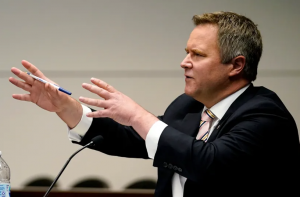Kyle Rittenhouse’s bail was left at $2 million Monday when he appeared at a Kenosha County court via an online hearing. Kenosha County prosecutors charged the 17-year-old with two felony homicide counts for the deaths of Joseph Rosenbaum and Anthony Huber, a felony attempted homicide for the injuries sustained by Gaige Grosskreutz, possession of a dangerous weapon while under the age of 18, and reckless endangerment, resulting from protests that turned violent in Kenosha on August 25th.
 Kyle Rittenhouse appears during a virtual pre-trial hearing on Monday in Kenosha County Circuit Court
Kyle Rittenhouse appears during a virtual pre-trial hearing on Monday in Kenosha County Circuit Court
Court commissioner, Loren Keating, ruled that Kyle represented a serious flight risk. “The charges are incredibly serious and again, if a conviction occurs there would be a likelihood of an imposition of a mandatory life sentence or at least significant amounts of time, likely decades of a period of incarceration. I believe that there’s a reasonable basis to flee.”
Kyle’s lawyers claimed he acted in self-defense, and argued strongly with the father and attorneys of one of the killed men over details in the case, who was at fault, and whether Kyle should be released on bail. Mark Richards, lawyer for Kyle said, "At a certain point the state can bury their head in the sand, but in reality, who struck my client first, who attacked my client first, Mr. Rosenbaum, the deceased."
Anthony Huber’s father, on the contrary, stated that Kyle “was an active shooter, and he tried to flee. Anyone who says otherwise is dead wrong, including the president." The $2 million bail amount was the same as the one a judge set some two months earlier when Rittenhouse was first charged.
Kyle’s extradition
Commentators in the legal community have been critical of Kyle’s lawyers’, especially of the failure to prevent his extradition from his home in Antioch, Illinois to Wisconsin last Friday. Lawyers, John Pierce, Mark Richards, and Lin Wood, filed a habeas petition (used on behalf of someone in custody), arguing that the federal interpretation of extradition from the 7th circuit court allowed them to raise probable cause challenges to the underlying criminal challenges. Legal expert, Robert Barnes notes that this is in fact not allowed under Illinois law, or in any US state, since states are governed by the extradition language in the Constitution.
Extradition between countries is governed by treaties between these countries, so probable cause challenges or charges against mistreatment, poor treatment, etc. under the rights granted by the constitution can be used to prevent an American citizen from being extradited to a foreign country. For cases of extradition from one state to another within the US on the other hand, the US Constitution requires that any state extradite a person to another state within the US simply on request. The only requirements are the formality of the request be proper, the identity of the person be confirmed, and that their charge is properly defined as a crime, so you would not be able to extradite someone for something that is not criminal.
On this last point, commentators say that Kyle’s lawyers could have made a better case against extradition via a principle of dual criminality because Illinois has a broader definition of self-defense than Wisconsin does. That is to say, what is a crime under Wisconsin law, is not a crime under Illinois law. Robert Barnes says that given the detailed probable cause affidavit Kyle’s lawyers had already filed with the Illinois court, which is assumed to be true under court rules, they created an opportunity to raise a case against extradition via dual criminality. For example, this was used in pre-Civil War cases when fleeing slaves could not be a crime in one state, such as Kansas, but was a crime somewhere else, like Mississippi.
 John Pierce appearing in court last Friday on behalf of Kyle Rittenhouse.
John Pierce appearing in court last Friday on behalf of Kyle Rittenhouse.
Barnes says the lawyer did not seem to realize that they were planning to make an argument that would only apply in international cases until the day of the hearing. The result being that they could only raise a technical point that one prosecutor did not swear out the extradition case before a judge, even though that technicality had been corrected. For Barnes, the substantive case for Kyle against the charges is fantastic, but his lawyers are not doing a good job. He says they are ill-experienced in representing clients charged with homicide, most of their past work is in libel/defamation cases. In an interview with the Milwaukee Journal Sentinel interview, Pierce said his lack of experience in homicide cases was not a concern. "I win trials, it's what I do."
Carol King received a first-class BA (honors) in History and Politics from Stirling University, along with an exceptional commendation for a study on US public opinion and Foreign Policy. She also completed a year of study at University of London before taking up a Graduate Proctor Fellowship at Princeton University. She further completed a MPhil in American Politics at Dundee University. Aspiring to be a writer/commentator on American politics, she now writes for UncoverDC.
Twitter: @CarolKing561


